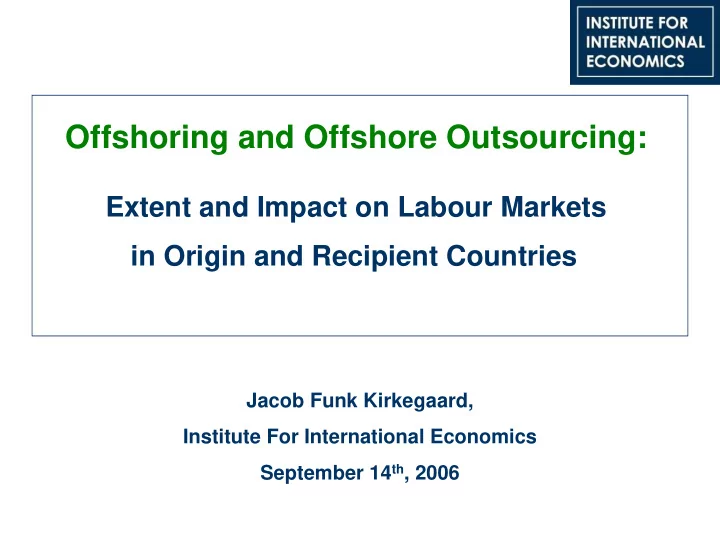

Offshoring and Offshore Outsourcing: Extent and Impact on Labour Markets in Origin and Recipient Countries Jacob Funk Kirkegaard, Institute For International Economics September 14 th , 2006
Data and Paper Focus Data Material: “Best Available” does not mean “Good” or even necessarily “Suitable For Policy Conclusions” Production Relocations: 1. Total or partial closure of an enterprise’s existing production units in one country with accompanying workforce reductions; and 2. Either the opening of affiliates abroad for the production of the same goods or services (offshoring), or the forging of a subcontracting contract with a non-affiliated firm for production of the same goods or services in their home country (outsourcing) and/or abroad (offshore outsourcing).
Impact on OECD Labor Markets United States: • Approximately 4 percent of large (50+) job losses associated with offshoring and offshore outsourcing in 2004-05 EU-15: • Approximately 5 percent of large (100+) job losses associated with offshoring and offshore outsourcing in 2004-05 • 56 percent in manufacturing; 44 percent in services • Large differences in intensity between EU countries Japan: • No repeated numerical estimates immediately available • “Local sales” dominate in affiliates’ sales in manufacturing, and exports to home-market (sales back to Japan) stable
Potential Future Impact on OECD Labor Markets Occupations Potentially Affected By O/O-O: (van Welsum/Vickery – OECD) (2005) 1. People exercising jobs where they are likely to make intensive use of ICTs in order to produce their outputs. 2. Their output can be traded/transmitted with the help of ICTs (ICT-enabled trade in services – “digitizable” services). 3. The work has a high explicit information or “codified knowledge” content (and no or little tacit or implicit knowledge). 4. The work does not necessarily require face-to-face contact. Estimates Are Generally Larger Than Total Manufacturing Employment in OECD Countries: Range of 10-20 percent of total employment (OECD; Bardhan/Kroll; Garner; Farrell/Rosenfeld; Blinder; Jensen/Kletzer; Levy/Murnane)
But “Jobs Affected” ≠ “Jobs Lost”
New Groups No Longer Seem Immune To The Biz-Cycle
Not Really a Trade Issue, Though, in the Long-Term Offshore Outsourcing is often merely a mid-point prior to automation • If something can be digitized and traded, it can very often also be automated • The cheapest labor of all is computers • No human winners in wage competition in many tradable services occupations • Technology will introduce increased skill bias in many services occupations also in recipient countries
So – Limited Direct Employment Impact In Recipient Countries. Domestic Companies Will Be Needed To Shoulder Burden of Job Creation
Very Rapid Broadening Skill Bias In Tradable Services Poses Significant Challenges For Countries With Large Unskilled Workforce
But Will Be A Windfall For The Well- Educated In Recipient Countries
Concluding Remarks 1. Direct Labor Market Impact of Offshoring and Offshore Outsourcing Limited in Both Origin and Recipient Countries 2. Information Technology, Tradability in Services and Potential Automation Raises the Skill Bias in Both Job Creation/Destruction In All Labor Markets – Seems Likely That “Offshoring” Will Be Blamed For All Costs of Dislocation 3. Recipient Countries Must Rely on Domestic Companies (or Multinationals Serving the Domestic Market) To Achieve Large- Scale Job Creation In Services Sectors 4. Recipient Countries With Large Unskilled Populations Face a Double Educational Challenge in Both Secondary and Tertiary Education 5. Without Focus on Domestic Liberalization, Asia Risks Continued “Lower Employment Elasticity Growth” and Increased Inequality in Both Job Creation, Income and Geographic Terms
Recommend
More recommend